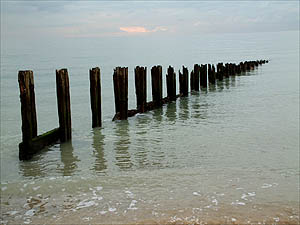Difference between revisions of "Resilience and resistance"
(Resilience and resistance moved to Resilience, adaptation and resistance of coastal and marine ecosystems: Merg) |
|||
| Line 1: | Line 1: | ||
| − | + | {{Incomplete}} | |
| + | |||
| + | |||
| + | Coastal and marine [[ecosystems]] are constantly changing and can respond to environmental disturbances both slowly or quickly. | ||
| + | Resistance is the capacity of an [[ecosystem]] to remain relatively unchanged when confronted by a disturbance, while [[resilience]] is the speed at which an [[ecosystem]] returns to its former state following a disturbance. | ||
| + | ==Introduction== | ||
| + | [[Image:Uses1.jpg|thumb|left|]]Coastal systems are naturally resilient. 'Hard' rock coasts resist the impact of [[waves]], [[tides]] and storms, whereas 'soft' rocks tend to erode and sedimentary systems respond by moving landward or seaward depending on the balance between erosional and accretional forces acting upon them. This article will discuss the implications of this in relation to coastal management. In particular it will argue that too often human intervention (land claim, infrastructure etc.) has helped to create 'problem' areas where erosion is considered to be a threat to the socio-economic fabric of an area rather than an opportunity for environmental sustainability or restoration. | ||
| + | [[Biodiversity]] allows the ecosystems to adapt to changing conditions. Humans, however, have acted to increase the rate of change and consequently, it will be a great challenge for the marine environment to adapt rapidly enough in the future. These changes have been induced through pollution, fishing, [[sediment]] deposition and alteration of the global climate. Without genetic diversity, natural selection cannot occur and natural selection is limited, then adaptation is impossible. It is evident that the preservation of biodiversity and, more specifically, genetic diversity is of paramount importance for successful adaptation to our rapidly changing environments. | ||
| + | |||
| + | |||
| + | |||
| + | |||
| + | ==References== | ||
| + | |||
| + | ==See Also== | ||
| + | [[Resilience as a criterion in marine biological evaluation]] | ||
| + | [[Category:Coastal processes, interactions and resources]] | ||
| + | [[Category:Coastal habitats and ecosystems in transitional waters]] | ||
| + | [[Category:Coastal and marine issues and impacts]] | ||
| + | [[Category:Restoration of coastal and marine zones]] | ||
| + | |||
| + | {{author | ||
| + | |AuthorID=11928 | ||
| + | |AuthorFullName=Vos, Matthijs | ||
| + | |AuthorName=Matthijs}} | ||
Revision as of 13:31, 3 February 2009

|
Coastal and marine ecosystems are constantly changing and can respond to environmental disturbances both slowly or quickly. Resistance is the capacity of an ecosystem to remain relatively unchanged when confronted by a disturbance, while resilience is the speed at which an ecosystem returns to its former state following a disturbance.
Introduction
Coastal systems are naturally resilient. 'Hard' rock coasts resist the impact of waves, tides and storms, whereas 'soft' rocks tend to erode and sedimentary systems respond by moving landward or seaward depending on the balance between erosional and accretional forces acting upon them. This article will discuss the implications of this in relation to coastal management. In particular it will argue that too often human intervention (land claim, infrastructure etc.) has helped to create 'problem' areas where erosion is considered to be a threat to the socio-economic fabric of an area rather than an opportunity for environmental sustainability or restoration.Biodiversity allows the ecosystems to adapt to changing conditions. Humans, however, have acted to increase the rate of change and consequently, it will be a great challenge for the marine environment to adapt rapidly enough in the future. These changes have been induced through pollution, fishing, sediment deposition and alteration of the global climate. Without genetic diversity, natural selection cannot occur and natural selection is limited, then adaptation is impossible. It is evident that the preservation of biodiversity and, more specifically, genetic diversity is of paramount importance for successful adaptation to our rapidly changing environments.
References
See Also
Resilience as a criterion in marine biological evaluation
Please note that others may also have edited the contents of this article.
|
